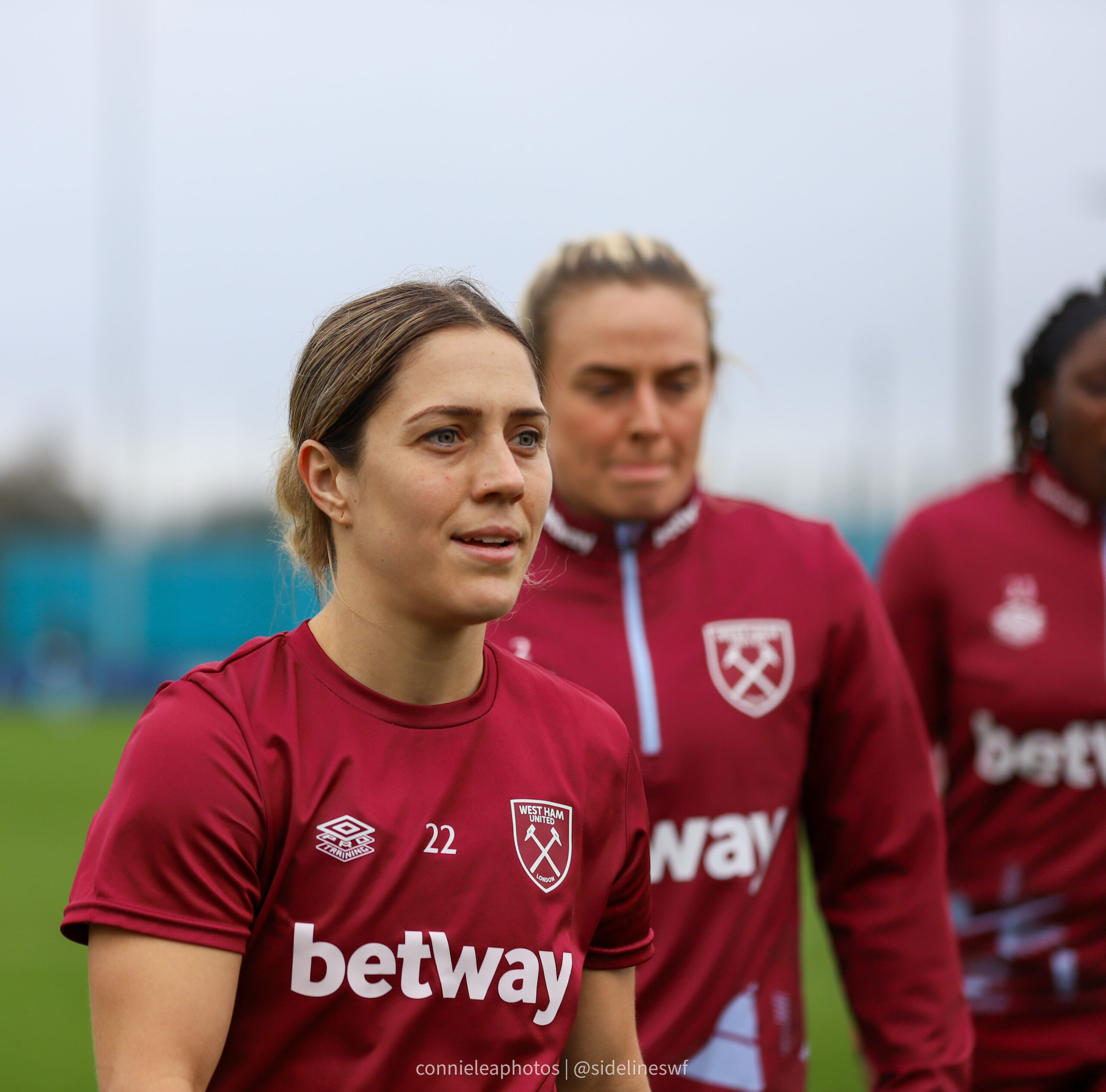Disclaimer: This article discusses topics related to eating disorders and mental health, which may be sensitive for some readers.
West Ham captain and Australian international Katrina Gorry joined the “BBC Women’s Football Weekly” Podcast with Ellen White, Jen Beattie and Ben Haines this January. She reflected on the challenges she’s faced both on and off the pitch, opening up about her struggles over the years. She discussed captaining West Ham this season and how motherhood has transformed her approach to the game, offering a new perspective and mindset.
Gorry was named captain of WSL side West Ham at the beginning of the 2024/2025 season. After sustaining a shoulder injury in the match against Brighton in November of 2024, she is now back in training following the winter break.
“It’s been really enjoyable, we’ve got such a good group of girls [..] with a lot of good personalities, a lot of good leaders […] my job is pretty easy to be honest, we just have to keep on building on our performances.” (on her role as captain)
Although she never envisioned herself in a captaincy role, her experiences playing in various countries alongside diverse teammates have equipped her with valuable insights for this leadership position. Additionally, becoming a parent has profoundly influenced her perspective, both on and off the pitch.
“I probably wasn’t the person people would come to when I was younger, but as I got older and definitely after I’ve had kids, I was much more nurturing […]. If players feel like they are cared for and appreciated you get the best out of them. That’s definitely something I’ve learned over the last couple years.”
She discussed the topic of body image both before and after pregnancy, emphasising the importance of addressing it—particularly how athletes can learn to respect and appreciate their bodies. For her, fostering an environment where people feel comfortable opening up, sharing their experiences, and supporting one another is essential.
The Matilda shared insights into her personal journey, reflecting on a challenging period in 2017 while living in Japan. During that time, she faced significant struggles beyond football, including family matters and navigating a difficult breakup.
“I felt like the thing I could control was my food.”
Although she had always been a strong athlete and rarely thought about her weight, weighing herself before training or breakfast gradually became a routine. Over time, this habit began to spiral, leading to deeper challenges.
“I thought this was just temporary, I’ll be able to get through it […] four years went past and I found myself in a really dark place.”
It got to a point where she didnt want to see anyone, go to training or get out of bed.
“They could see that I was going through things, but no one really wanted to ask questions […] nobody really knows how to respond.”
Gorry shares her story to help others avoid walking the same challenging path she did. By speaking out, she created a space for family, friends, and fellow athletes to open up, share their own experiences, and support one another—encouraging conversations before anyone falls into a difficult spiral. Her personal experiences have also given her a unique ability to connect with and approach those who are struggling, a perspective that may be harder for others who haven’t faced similar challenges.
“For me it was 3 years before I was able to even speak to my family about it.”
Before she gave birth to her daughter Harper in 2021, she didn’t really intend to return to playing football. During her pregnancy, she found herself watching more football and gradually developed a deeper respect and love for her body. This newfound appreciation played a significant role in her decision to return to football after giving birth to her daughter, Harper. A couple of months later she played “some of her best football” at Brisbane Roar, before going back to Sweden to play for her former team Vittsjö GIK.
“I felt like a kid again […] there was no pressure, […] it was just a pure enjoyment again.”
Katrina Gorry joined West Ham in January 2024, where she received a lot of support from coach Rehanne Skinner.
“On my way to the Arsenal game, Harper was spewing in the back seat. I called Rehanne, because I don’t even know what to do, what do I even say here?”
Skinner remained calm and reassured her, prioritising her well-being by telling her to take care of Harper and clean up rather than worrying about arriving on time.
“In that moment there would have been other coaches I’m sure, that would be like, okay well, you gotta get to the game.”
With the support of her teammates, staff and coach, she was very calm about the situation and came back to do her job with confidence, knowing people are behind her.
“It made me so proud to play for a club like this.”
Under Tony Gustavsson’s coaching for Australia, Gorry received the support she needed on the international stage. During the 2023 World Cup, despite the demanding schedule, she was able to bring her mother and daughter, Harper, along, helping to create a safe and calm environment within the team. This fostered some heartwarming and memorable moments, both on and off the pitch.
Now, Gorry is excited about the future with West Ham in the WSL, contemplating the possibility of making the club her home for the remainder of her career.
BBC Women’s Football Weekly Podcast with Ellen White, Jen Beattie and Ben Haines – https://www.bbc.co.uk/sounds/play/p0kjmgry
If you or someone you know has been affected by the topics discussed in this article, visit BBC Action Line: https://www.bbc.co.uk/actionline/ for links to websites that offer support and help.



